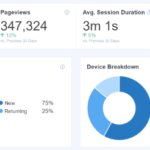[ad_1]
In today’s dynamic landscape, students are mastering the delicate art of juggling full-time studies with short-term retail freelance opportunities.
This unique balance not only allows them to gain valuable work experience but also supplements their income. Let’s uncover their tips, and peek into Gig4U, where students find exciting gigs—remote, part-time, and more!
The rise of project-based roles
As traditional employment structures evolve, students are increasingly leveraging project-based roles to fit their academic schedules. Recent statistics indicate that over 40% of students engage in some form of freelance work during their academic journey.
A comprehensive survey conducted across various universities revealed that an impressive 63% of students actively seek short-term freelance opportunities to enhance their skills and boost their income, reflecting a growing trend in the student workforce.
The allure of full-time academia
While the gig economy presents lucrative opportunities, students remain committed to their primary goal: academic success. The appeal of full-time studies remains strong, with a significant 78% of respondents citing it as their top priority.
In-depth research indicates that 72% of students who engage in freelancing prioritize projects that align with their field of study, showcasing a strategic approach to skill development and future career prospects.
Company culture: a crucial factor
Impact on freelance engagement
The organizational culture of companies offering freelance opportunities plays a pivotal role in attracting and retaining student talent. Students are drawn to organizations that value collaboration, flexibility, and mentorship.
Students overwhelmingly prefer companies with a positive and inclusive company culture. A resounding 85% of respondents believe that a supportive work environment enhances their freelancing experience, indicating that beyond the paycheck, the cultural fit is a significant motivator for student freelancers.
A guide to navigating company cultures
For students entering the freelance arena, understanding and navigating diverse company cultures is essential. Here’s a comprehensive guide to help students find the right fit:
-
Research potential employers: Delve into company reviews and testimonials to gauge the company’s culture accurately.
-
Networking: Connect with current or former freelancers from the organization to gain firsthand insights into the working dynamics.
-
Align values: Choose freelance opportunities that align with personal and professional values, ensuring a harmonious work relationship.
-
Evaluate communication channels: Assess how the company communicates and collaborates, ensuring it aligns with your preferred working style.
-
Gig4U Platform: Explore specialized freelance platforms like Gig4U that connect students with companies fostering a positive work culture.
Maximizing project-based income
Diversifying roles for financial stability
One of the key advantages of short-term freelance work is the ability to take on various roles. From content creation to social media management, students can diversify their skill set and income streams.
Additional strategies for role diversification:
-
Skill assessment: Regularly assess your skills to identify areas for improvement and expansion.
-
Industry trends: Stay updated on industry trends to anticipate emerging skills in demand.
-
Networking events: Attend industry-related networking events to discover new opportunities and skill requirements.
Setting realistic income goals
While the gig economy offers financial flexibility, setting realistic income goals is crucial for sustainable freelancing. Students should assess their workload capacity, skill level, and the time commitment required for each project.
Additional tips for setting income goals:
- Market research: Understand the average rates for your freelance services within your industry.
- Budgeting: Create a comprehensive budget that considers your academic and personal expenses.
- Long-term planning: Set long-term financial goals to guide your freelancing efforts.
- Gig4U Platform: Leverage platforms like Gig4U to explore a wide range of freelance opportunities that align with your income goals.
Gig4U: Revolutionizing freelance opportunities for students
Gig4U is a leading freelance platform that caters specifically to students seeking diverse opportunities. Whether you’re looking for remote work, fieldwork, side hustles, or part-time gigs, Gig4U connects you with a myriad of options.
-
Remote work: Explore a variety of remote opportunities, allowing you to work from the comfort of your home or campus.
-
Fieldwork: Engage in hands-on experiences with fieldwork opportunities that complement your studies and provide practical skills.
-
Side Hustles: Discover side hustles that align with your interests and passion projects, allowing you to showcase your creativity.
-
Part-Time Gigs: Easily find part-time gigs that fit into your busy academic schedule, providing flexibility and supplemental income.
Gig4U stands out for its user-friendly interface, comprehensive job listings, and commitment to supporting students in their freelance journey. Visit Gig4U to explore a world of freelance opportunities tailored for students.
The future of student freelancing
Evolving trends and opportunities
As technology continues to reshape industries, students are likely to encounter new and exciting freelance opportunities. The emergence of virtual internships, remote collaborations, and global networking platforms is transforming the landscape for student freelancers.
The gig economy is projected to experience a substantial 30% growth in the next five years, creating a wealth of opportunities for students to engage in short-term projects aligned with their academic pursuits.
Adapting to changing work dynamics
To thrive in the dynamic world of freelancing, students must stay adaptable. Embracing emerging technologies, cultivating a growth mindset, and continuously updating skill sets are vital for long-term success.
Pro tip: Attend workshops, webinars, and industry events to stay informed about the latest trends and opportunities in your field, ensuring you remain at the forefront of industry developments.
Additional strategies for adapting to change:
-
Continuous learning: Enroll in online courses or certifications to stay updated on industry advancements.
-
Mentorship: Seek mentorship from experienced freelancers or industry professionals for guidance.
-
Global networking: Engage in global networking to gain diverse perspectives and insights.
Conclusion
Balancing studies and freelancing is a challenge, but it’s also a chance to shine. cheers to students creating their success stories in the changing world of work!
[ad_2]
Source link






